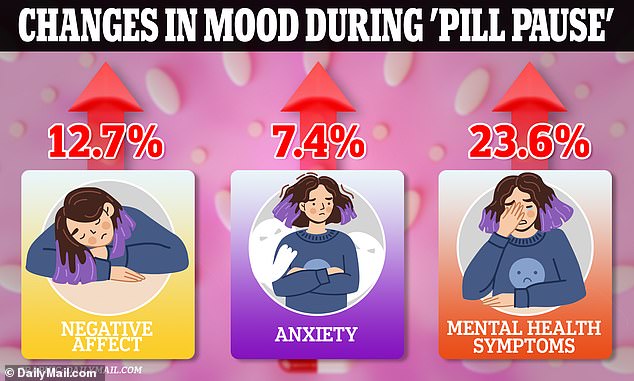Women are more anxious and depressed AFTER stopping birth control, study suggests
Women who stopped using oral contraceptives experienced more mental health problems than while taking the contraceptives.
Researchers in Austria found that young women who did not use combined oral contraceptives (COCs) for a month were almost 25 percent more likely to experience negative mental health consequences.
COCs, also known as ‘the pill’, contain both estrogen and progestin, two female hormones that affect a woman’s menstrual cycle and sexual health.
They also found that symptoms were similar to those of women who do not use birth control during their menstrual cycle, suggesting that stopping birth control has a similar hormonal impact.
The results showed that during their ‘pill break’, a break from taking their contraceptives, women experienced a 7.4 percent increase in anxiety, and a 23.6 percent increase in overall mental health symptoms while off the pill .
Among women, 12.6 percent also saw an increase in negative affect, including negative emotions such as anger, contempt, disgust, guilt, fear and nervousness.
The researchers said this shows that oral contraceptives can help improve mood with long-term use. This goes against ideas proposed in other studies that birth control use can increase depression and anxiety.
“These results question the usefulness of pill breaks from a mental health perspective,” the researchers wrote.
Researchers in Austria found that young women who stopped using combined oral contraceptives (COCs) for a month were almost 25 percent more likely to experience negative mental health consequences

The researchers found an increase in negative affect, anxiety, and general mental health symptoms when participating women stopped using oral contraceptives. Negative affect is a personality change associated with anger, increased sensitivity, and anxiety
The study examined 181 women aged 18 to 35 who used oral contraceptives for at least six months between April 2021 and June 2022, but stopped for a month. None of the participants were taking other medications or reporting a history of mental health problems.
The researchers scheduled follow-up visits during the participants’ menstrual cycle, during which they completed health surveys and mood questionnaires and performed cognitive and emotional recognition tasks.
‘Our data suggest a significant increase in negative affect, anxiety and mental health symptoms during the pill break in long-term COC users, the team wrote.
This increase in anxiety and depression was similar to the increase that women who do not use contraception may experience during their periods.
However, a limitation of the study was that the researchers did not include women who might have experienced mental health problems after less than six months of using the birth control pill.
These findings are consistent with other recent studies suggesting that birth control pills may somehow impact women’s mental health.
A study published in June by researchers in Sweden found that women who used birth control as teenagers were 130 percent more likely to become depressed as adults.
In addition, those who started oral contraceptives in adulthood had a 92 percent risk of depression.
Therese Johansson, lead author of the Swedish study, said: ‘The powerful impact of birth control pills on teenagers can be attributed to the hormonal changes brought on by puberty.
‘Since women in that age group have already experienced substantial hormonal changes, they may be more receptive not only to hormonal changes, but also to other life experiences.’
Another separate study JAMA Psychiatry A 2016 study by experts at the University of Copenhagen found that among more than a million Danish women, those who used hormonal contraceptives had a 0.9 to 1.9 times greater risk of a first diagnosis of depression.
Teenage girls had an even higher risk, ranging from 1.2 times to 3.2 times, but researchers acknowledged that this could be attributed to the age group being generally more susceptible to depression symptoms.
On the other hand, a wealth of evidence has accumulated over the years showing that birth control pills can actually improve mood and emotional health.
In a 2013 report in the American Journal of EpidemiologyAmerican doctors studied the effects of contraception in a sample of more than 6,600 sexually active non-pregnant women.
They found that hormonal contraceptive users had, on average, lower levels of depressive symptoms and were less likely to have attempted suicide in the previous year compared to women who used non-hormonal contraception and those who did not use anything at all.
And a Study from 2003 Research from doctors at Brigham and Women’s Hospital in Boston found that a fraction of the 658 women who used oral contraceptives — just over 16 percent — saw their mood worsen by the pill.
But the vast majority of them, more than 71 percent, saw no change in their mood at all.
The authors of the new study stated that more research is needed to determine how stopping birth control can affect mental health in the long term.
The results were published in a study in the journal on Wednesday JAMA Open Network.
